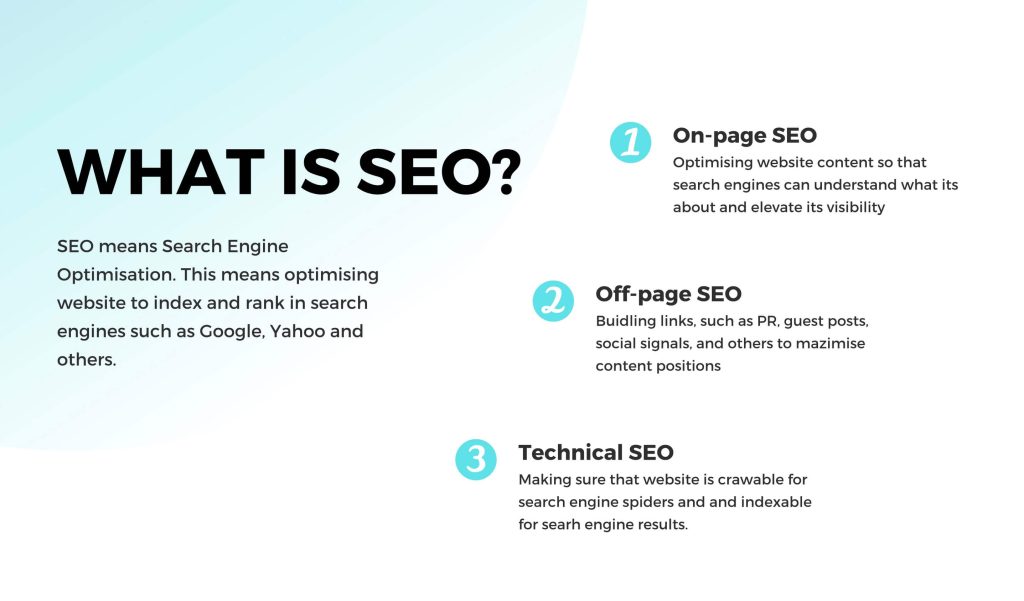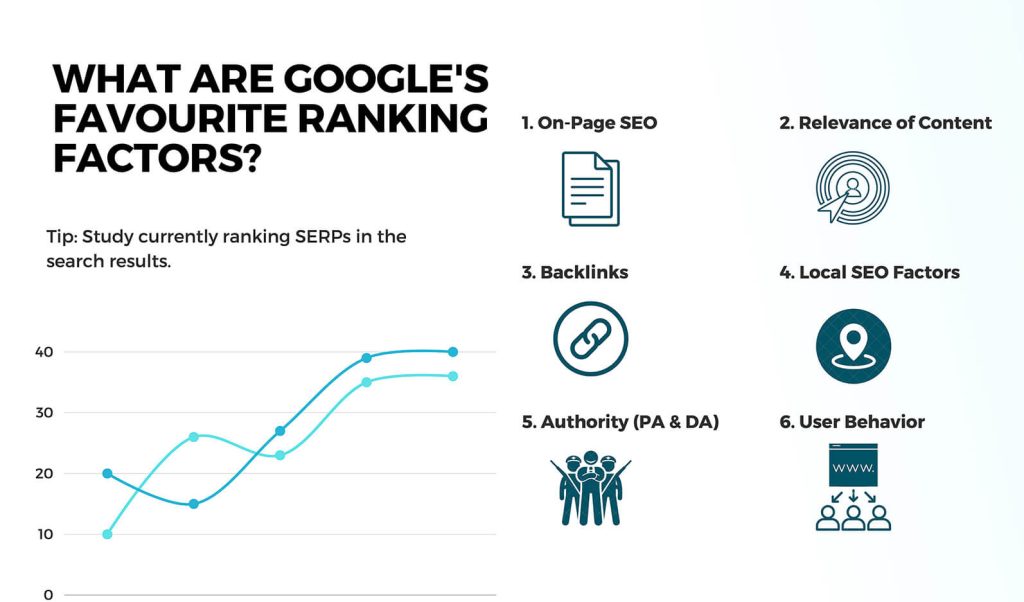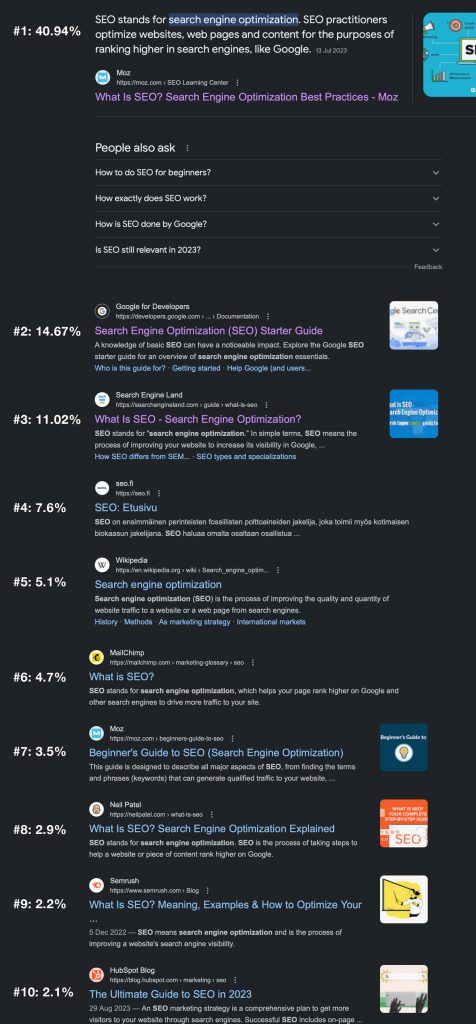What is Search Engine Optimisation and how does it work?
SEO means optimising your website content for better visibility and positioning in search engine results. It is divided into on-page, off-page, and technical optimisation. In simple terms, it works by optimising content, building links, and fixing technical issues. It is a sought-after digital marketing strategy because being on the top of the search engine results makes your content found by visitors most effectively. The most important factor to succeed in SEO is to follow search engine best practices and guidelines to ensure you have the best chance to increase organic traffic.

Share this post:
How does SEO work?
SEO works by search engines analysing your technical structures, content, and link profile, and then comparing it with other competitors to determine what ranking should they provide you.
Essentially they are trying to understand what content is best for their users. Everyday visitors who search for information from search engine.
In short, if you perform better in providing most accurate content that aligns with visitors’ intent, you will receive a higher positioning in search results and vice versa.
How do search engines work, and how do they find your content?
Search engines use bots (also called crawlers or spiders) to crawl your website to find pages, content (text, images, videos, etc.) and links. Each site gets allocated a certain amount of pages/links crawled per month, also know as crawling budget. Smaller sites get less, larger more.
You can also manually enter your pages into the search console for initial indexing when launching a website or when you change the content to make indexing faster.
In a nutshell search engines’ job is:
- Crawl and find your content
- Understand what your pages are about
- Compare them with others
- Rank yours higher than competitors
Therefore, it is crucial not to have any technical errors that hampers crawling and spends valuable crawling budget.
And it is yours or SEO specialists job to make sure your site is crawlable and indexable and ranking well.
What are the top Google’s search ranking factors?

Google uses over 200 ranking factors to determine your SERP position, but a 6 of the most important ones are:
- On-page SEO factors
- Relevance of content
- Backlinks
- Local SEO factors
- Authority (PA & DA)
- User behaviour
Other factors such as website speed performance, technical SEO, social signals and schema markup are equally important factors.
Why is SEO important?
SEO is important because it has a direct correlation on how much organic traffic your site generates. If you want to do this successfully, you need to optimise your content for search engines best practices.
List of Googles top 10 organic search results and CTR (click through rate) of each

- Result #1: 40.94%
- Result #2: 14.67%
- Result #3: 11.02%
- Result #4: 7.6%
- Result #5: 5.1%
- Result #6: 4.7%
- Result #7: 3.5%
- Result #8: 2.9%
- Result #9: 2.2%
- Result #10: 2.1%
If we calculate the Top 10, meaning the results found on the first page, they account for 94.73% of the total organic clicks from search engine results, as reported by Advanced Web Ranking.
Now let’s check real life example.
Here is example of SEO SERPs positions and CTR % of each:

Comparing results:
- The 1st place gets a whopping 40.94% of clicks.
- The top 3 results get 66.63% of clicks.
- Top 10 results gets 94.73% of clicks.
- The rest of the pages from 2-100 and sometimes even more only share 5,27% of clicks (remember there is 10 positions on each page).
Ask yourself what position would you want your websites content to be? The answer should be clear by now.
Imagine a large volume keyword or set of smaller keywords that have a total 1000 clicks per month, the first rank gets 40%, which is 400 clicks. It is like having a monopoly in generating of high quality traffic for free.
This is why businesses, enterprises, and bloggers want to be on page one or rank 1 – it generates the most traffic.
But it takes time to get to page 1, not to mention the top 1 position. No seriously. If it is high volume keyword with hard competition, it is very hard.
This is why it is best to start with SEO sooner than later. Especially with a new website because it takes even longer before Google trusts you and gives you better rankings. Also, it is why SEO should be an ongoing process in every businesses marketing strategy.
While it costs time or budget at the start, the long-term benefits outweigh it by manyfold compared to any other marketing channel.
What are the main benefits of SEO
Here are main, but not limited benefits of implementing SEO for a website:
- Improved visibility: If you optimise for search engines, more people will be able to find your content and become familiar with your brand. Hence, you gain higher brand awareness and improved visibility.
- Improved traffic: The more keywords you are targeting and the higher they rank, the more organic traffic you receive. Also, keywords that rank higher can push lower keywords to rank higher. You can further amplify this with targeting related keywords in blog articles.
- Improved credibility: Search engines analyze your website’s SEO performance and rank you based on that. The higher your ranking is, the more credible your business is perceived to be by visitors.
- Increased qualified leads and sales: If you SEO is executed correctly, you can get your content in front of high-quality leads, and some percentage of them will enter your site – you can then turn these into sales.
SEO tools
Tools in SEO help you to optimise your site effectively. Without them it’s almost impossible to do anything. Three main types of SEO tools are keyword research, on page SEO and auditing tools.
Keyword research tools
- Ahrefs
- Semrush
- Keyword planner
- Answer the public
- Google trends
- Keywordtool.io
- Moz SEO toolbar
- Surfer SEO
- Neilpatel Ubersuggest
On-page seo plugins
- Yoast SEO
- Rankmath
- All in One SEO
- The SEO Framework
Website audit/analysis tools
- Google Analytics
- Google Search Console
- Ahrefs Webmaster
- Screaming Frog
What are SEO types?
SEO is divided into 3 types:
- Technical SEO, means optimising your websites technical backend so that search engines can crawl, index and make sense what your content is about.
- On-site SEO, refers to optimising content on a website so that its content is relevant to user intent.
- Off-site SEO, consists of earning links through creating good content, PR, citations, social media and guest posts to increase authority of your sites pages.
Techincal SEO
Technical SEO is the foundation of making your new or old website crawlable and indexable by search engine spiders.
Some common, but not limited, technical SEO elements are:
- Site architecture
- Crawler errors
- Thin content
- Duplicate content
- Missing or duplicate h1 heading
- Missing, too short or too long description
- Indexing issues
- Slow performance
- Mobile friendliness
- HTTP/HTTPS
- Robot.txt
- Analytics
- Structured data
- Internal links
- And many others.
On-site SEO
On-page SEO means performing keyword research, customer research, and competitor research and using the findings to optimize your website content to be found by people who search it on the Internet.
Common elements to be optimised, but not limited are:
- URLs
- Pages
- Images
- Headings (H1-H6)
- Page titles
- Meta tags
- Subheadings
- Bullet points
- Statistics
- Quotes
- Internal links
TIP: Check what content ranks for any keyword or page you try to rank and use it for your benchmark. It does not matter if its a service page, products or blog post – the same strategy works for all.
Off-site SEO
Off-page SEO increases the authority and credibility of your website to maximize your content visibility. It works by getting other blogs, websites, businesses, news, and social media to link to your website.
The more links your site earns, the higher its content ranks. That said, the more relevant links to your business or industry your website gains, the more its results are amplified.
Some common ways to receive links are, but not limited to:
- Creating quality content – that others want to naturally link back to from their content. In-depth articles, statistics, and long how-to articles work amazingly here.
- PR – involves writing press releases and media pitching for news and other publications.
- Guest post – is when you are feature in other blogs, vlogs, or podcasts.
- Citation – business or local citations help your website build its initial trust.
- Social media – creating social media profiles and posting content that have links to your website.
Consider hiring an SEO agency
Hiring an SEO agency is the fastest way to maximize SEO results. Seriously. It takes 4-5 years to master that profession.
It does not matter if it’s a new website or an old site that needs uplift – we can help. Our SEO team has over 11 years of experience growing organic traffic for our clients.
Real life SEO Campaigns example
Basic
€2500/mo
Ideal for initial setup of a new, freelancers or small website
Professional
€6000/mo
Ideal for a small & medium size websites want to scale
Ultimate
€8000+/mo
Ideal for large sites, competitive niches or enterprises
Frequently asked questions
Get a free SEO proposal today!
Let our SEO experts audit your website to analyse what works and what not and what needs to be fixed.
SEO blogs
SEO prices
Discover how much should hourly, project-based and monthly retainer SEO package cost and what should each include.
What is technical SEO?
Learn what are the technical factors that allow search engines access, index and rank your website.
